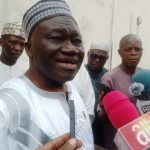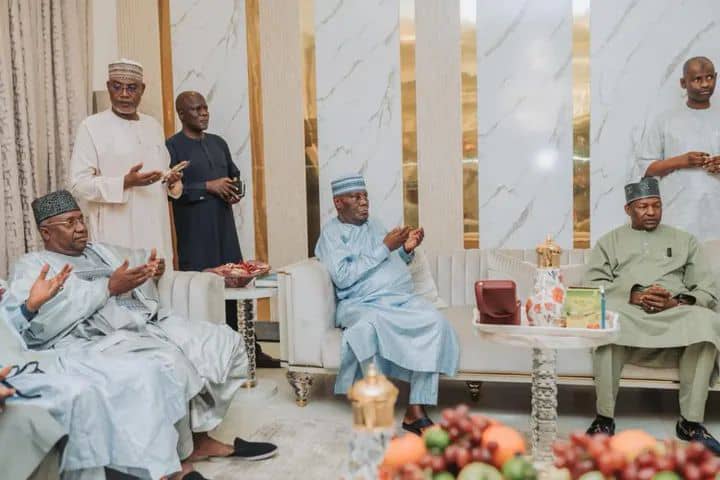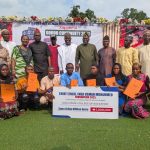A STORY OF COURAGE, COMPASSION, AND A CALL FOR DEMOCRATIC RENEWAL- ABUBAKAR MALAMI SAN.
By Bala Salihu Dawakin Kudu Democracy Newsline Newspaper
September 9th, 2025
In a quiet yet deeply symbolic gathering that echoed far beyond the walls of his residence, Abubakar Malami, SAN, the former Minister of Justice and Attorney General of the Federation, received an esteemed guest: Former Vice President Atiku Abubakar. The visit, though private in setting, carried profound national significance. It was more than a gesture of camaraderie—it was an affirmation of the democratic ideals both men have long championed.
The meeting came in the aftermath of a disturbing episode in Kebbi State, where Malami’s convoy was violently attacked by thugs allegedly sponsored by the ruling All Progressives Congress (APC). The attack left a trail of destruction and fear, shaking the foundations of democratic tolerance in the region. For Malami, a senior statesman and legal luminary, the violence was not just a personal affront—it was an assault on the democratic process itself.
Moved by the statesmanship and empathy of Atiku Abubakar, Malami welcomed the former Vice President’s visit as “a powerful symbol of solidarity in a time of rising political tension and insecurity.” Their conversation, according to sources close to the former Attorney General, was frank, urgent, and reflective—centered on the disturbing trend of orchestrated political violence rapidly spreading across Nigeria’s geopolitical landscape.
“This visit,” Malami said in his remarks, “is a reminder that democracy thrives not through intimidation or violence, but through dialogue, accountability, and mutual respect. We must return to the principles that bind us together as Nigerians, not those that tear us apart.”
Malami did not shy away from drawing attention to the broader context. The attack in Kebbi, he emphasized, was not an isolated incident but part of a troubling and coordinated pattern of politically motivated violence that has erupted across the country in recent weeks.
In Kaduna, just days before the Kebbi attack, a meeting of the African Democratic Congress (ADC)—a coalition gathering led by Mallam Nasir El-Rufai, a former governor turned opposition figure—was violently disrupted. Armed thugs stormed the venue, injuring several party officials and damaging vehicles, all while law enforcement stood by in apparent complicity. The brazenness of the attack, Malami noted, “speaks to a dangerous culture of impunity, one that undermines our democratic institutions and endangers the safety of our citizens.”
Likewise, in Lagos State, another chilling event unfolded. Gbadebo Rhodes-Vivour, former Labour Party governorship candidate and now a vocal opposition ally, narrowly escaped injury when hired hoodlums attacked a peaceful rally in Alimosho. The gathering, which was to feature respected national figures, ended in chaos as participants were assaulted and forced to flee.
“These incidents,” Malami warned, “point to an orchestrated attempt to weaponize fear, stifle opposition, and ultimately erode the foundation of our democracy. It is a grim reminder that violence, when politicized, becomes a tool for tyranny.”
In a moment of solemn reflection, Malami expressed deep appreciation for Atiku Abubakar’s presence, describing it as “heartening proof that our nation still has leaders who place principles above politics.” Their meeting was not just about shared grievances—it was a call to action.
“We must not allow our democracy to be hijacked by thugs in political clothing,” Malami said. “We must demand accountability—not only from those who commit violence but also from those who enable it, those who fund it, and those who look the other way.”
He reaffirmed his unwavering commitment to justice, pledging to continue using every legal channel available to defend the rights of citizens, ensure the sanctity of elections, and uphold the rule of law.
What stood out most from the meeting was the message of shared humanity. Despite belonging to different political traditions, both men found common ground in their belief that Nigeria’s survival depends on a united front against the forces of division.
“Let this moment serve as a clarion call,” Malami concluded. “The path to a stronger Nigeria lies not in partisanship, but in unity, in justice, and in the unwavering pursuit of truth. We cannot afford to let violence become the language of our politics. The time to reclaim our democracy is now.”
As the two leaders shook hands that day, the message was clear—not just to their supporters, but to all Nigerians. Democracy is not a gift; it is a collective responsibility. And in times of darkness, it is the courage to speak out, to stand up, and to extend a hand across the aisle that keeps its flame alive.
Their meeting may not have made national headlines, but in the quiet dignity of that exchange, a line was drawn—a line between the rule of law and the rule of fear, between a politics of violence and a politics of principle. And in that, there lies hope.












